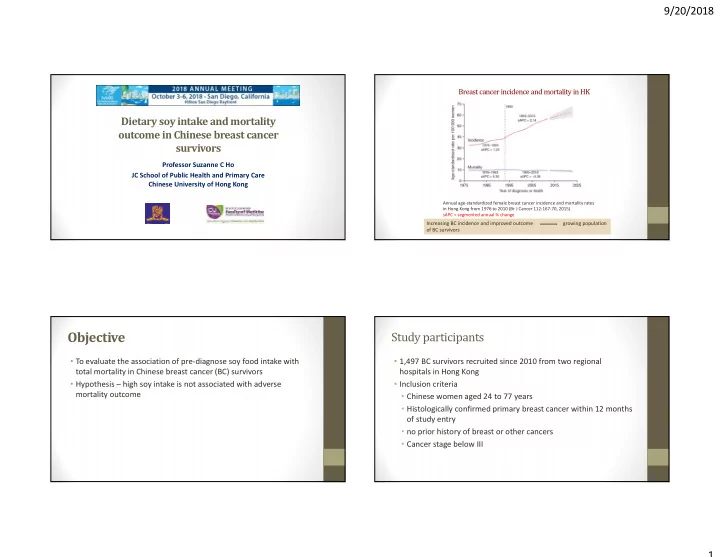

9/20/2018 Breast cancer incidence and mortality in HK Dietary soy intake and mortality outcome in Chinese breast cancer survivors Professor Suzanne C Ho JC School of Public Health and Primary Care Chinese University of Hong Kong Annual age‐standardized female breast cancer incidence and mortality rates in Hong Kong from 1976 to 2010 (Br J Cancer 112:167‐70, 2015) sAPC = segmented annual % change Increasing BC incidence and improved outcome growing population of BC survivors Objective Study participants • To evaluate the association of pre‐diagnose soy food intake with • 1,497 BC survivors recruited since 2010 from two regional total mortality in Chinese breast cancer (BC) survivors hospitals in Hong Kong • Hypothesis – high soy intake is not associated with adverse • Inclusion criteria mortality outcome • Chinese women aged 24 to 77 years • Histologically confirmed primary breast cancer within 12 months of study entry • no prior history of breast or other cancers • Cancer stage below III 1
9/20/2018 Methods Flow chart on subject recruitment • Interviewer‐based questionnaire 2811 Incident cases of breast cancer diagnosed • Soy food and overall diet intake based between 2010 and 2013 1349 Cases excluded on109‐item food frequency questionnaire 580 Refusals 769 Excluded for health or during the year prior to diagnosis communication problems 1497 Completed baseline survey • Socio‐demographic, medical, reproductive and lifestyle factors • Prognostic characteristics (clinical records) • Anthropometric measurements 18-mo Post-diagnosis follow-up • Data collection repeated at 18‐, 36‐, and 60‐ month followup • Study still on‐going 36-mo Post-diagnosis follow-up 60-mo Post-diagnosis follow-up (Ongoing) The Hong Kong Breast Cancer Survival Study (HKBCSS) Outcome Measure Findings • All‐mortality during followup till November 2017 (mean • 96 deaths (5.9% premenopausal and 7% postmenopausal) 50.9±9.916.8 months) (78% retention rate) occurred during followup • Mortality obtained from active follow‐up and computerized clinical management system • Adjustment made for potential confounders: age, body mass index, education, radiotherapy, chemotherapy, ER/PR status, HER2 status, menopausal status, cancer stage and dietary energy intake 2
9/20/2018 Findings Summary Conclusion • No evidence to show pre‐diagnosis soy food intake increases Our prospective study showed that mortality risk among Chinese BC survivors • Pre‐diagnosis soy intake did not increase the risk of all‐cause • Moderate soy food intake might be associated with better survival mortality in BC survivors • A linear dose‐response pattern till quartile 3 (6 ‐12 mag/d) , while no additional benefit beyond was observed • Study is still ongoing longer followup will provide further evidence on the effect of pre‐ and post‐diagnosis soy intake on BC outcomes Acknowledgements • Team members Winnie Yeo, Ashley Cheng, Carol Kwok, Roselle Lee, Yuan yuan Lei, Yiqian He, CK Iris Lee, KL Cheung , YM Aggie Ip • Participants of the study • Study supported by the World Cancer Research Fund International Grant No. 2010/249 and 2014/1197 3
Recommend
More recommend